Lexical Ambiguity in English Advertisement Slogans of Unilever Products
on
ISSN: 2302-920X
Jurnal Humanis, Fakultas Ilmu Budaya Unud
Vol 19.1 Mei 2017:93-101
Lexical Ambiguity in English Advertisement Slogans of Unilever Products
I Gusti Ayu Dwi Dharmayanti1*, I Ketut Tika2, I Gede Putu Sudana3 [123]English Department, Faculty of Arts, Udayana University 1[gustiayudwi5@gmail.com] 2[ketut_tike@yahoo.com]
3
*
Corresponding Author
Abstrak
Skripsi ini berjudul Ambiguitas Leksikal dalam Slogan Iklan Berbahasa Inggris dari Produk-Produk Unilever. Penelitian ini bertujuan untuk mengidentifikasi makna yang paling sesuai dari ungkapan ambigu dalam slogan iklan berbahasa inggris dari produk-produk Unilever dan menemukan faktor leksikal yang dapat menyebabkan ambiguitas leksikal.
Sumber data penelitian ini diambil dari situs terkenal Unilever yang dimuat dalam situs https://www.unilever.com/brands. Penelitian ini merupakan penelitian pustaka dan data penelitian ini dianalisis menggunakan metode kualitatif. Penelitian ini menerapkan Teori Makna oleh Geoffrey Leech (1974: 10-22) untuk menemukan makna yang paling sesuai untuk kata-kata ambigu dan juga didukung dengan Kamus Oxford Advanced Learner untuk menentukan makna leksikal dari kata ambigu. Teori lain yang digunakan dalam penelitian ini adalah teori Ambiguitas leksikal oleh Ullmann (1977: 158) untuk menganalisis faktor-faktor leksikal yang dapat menyebabkan ambiguitas leksikal.
Temuan menunjukkan bahwa pada bagian pertama diantara 13 merek global dari Unilever yang dianalisis, 10 slogan berisi kata-kata ambigu yang mana dari katakata ambigu tersebut dikategorikan sebagai makna Konseptual dan makna dari katakata ambigu pada 3 slogan lainnya dikategorikan sebagai makna Konotatif. Sedangkan, pada bagian kedua ditemukan bahwa faktor leksikal yang menyebabkan ambiguitas leksikal pada 7 slogan merek adalah Polysemi dan faktor leksikal yang menyebabkan ambiguitas leksikal pada 6 slogan merek lainnya adalahHomonimi. Hal ini berarti bahwa ambiguitas leksikal bisa terjadi dalam slogan produk-produk merek terkenal Unilever. Tidak dapat dipungkiri bahwa ambiguitas semakin membuat produk-produk Unilever menjadi terkenal dan siapapun yang melihat iklan-iklan tersebut akan tertarik khususnya pada produk-produk tersebut.
Kata kunci: ambiguitas leksikal, makna leksikal, iklan, slogan
Advertisement can be defined as a notice or announcement to promote products or services. In advertisement there is usually a Slogan as a part of language to make the advertisement more interesting. Sometimes, some slogans in advertisements contain ambiguities. Ambiguity occurs when both words and sentences have more than one meaning. If it occurs in the level of word it is called lexical ambiguity. In analyzing the lexical ambiguity, it is important to know the lexical meaning (meaning of the word based on the dictionary) of the ambiguous words and the lexical factors that may lead to the lexical ambiguity such as polysemy (when a single word has two or more different but related meaning) and homonymy (when words having the same spelling and pronunciation but completely different meaning). The reason why the analysis of lexical ambiguity in English advertisement slogan has become the topic because the ambiguous expression appears in slogan advertisement campaign of Unilever products and rich in lexical ambiguity. To find the most suitable meaning of the ambiguous expression in the slogans can be analyzed using the Theory of Meaning proposed by Leech. The extended analysis about the lexical factors that may lead to Lexical ambiguity can be analyzed using the theory of Lexical Ambiguity by Ullmann.
There are two problems formulated in this study based on the background:
-
a. What are the most suitable meanings of the ambiguous expression caused by the lexical ambiguity found in the advertisement slogans of Unilever products?
-
b. What lexical factors can lead to the lexical ambiguity?
After formulating the problems of the study, the aims of the research are:
-
a. To identify the most suitable meanings of the ambiguous expression caused by the lexical ambiguity found in the advertisement slogans of Unilever products.
-
b. To analyze the factors of lexical ambiguity found in the advertisement slogans of Unilever products.
The data chosen for this study were taken from the prominent website of Unilever published in website https://www.unilever.com/brands. All of the data were slogans of Unilever global brands which contain lexical ambiguity. In collecting the data, the library research method was applied to obtain detailed information regarding theory of meaning and concept of lexical ambiguity.The note taking technique was applied by taking notes of the whole slogans which contains the ambiguous words. The collected data were analyzed using the descriptive qualitative method.
This analysis presents some slogans of Unilever Global brands which contain
ambiguous words.
5.1 Data 1

Dove helps women to improve the condition of skin and hair through its products because Dove products offer softness and smoothness to the skin and hair of the user. Based on the Oxford Advanced Learner’s Dictionary, the word Dove in the slogan “All you need is Dove” is Lexical ambiguity because dove can mean “bird” and “A
person who advocates peace”. Dove as a bird (n) represents femininity, peace, tenderness that symbolizes the beauty of women and became the basis of Dove products campaign implied through its slogan campaign “Campaign for Real Beauty” (2004). Meanwhile, Dove as a person who advocates peace (n) refers to the women themselves encouraged by Dove through its products to make peace with their own beauty. From both meanings, the most suitable meaning for the ambiguous word dove is bird because as a bird, dove has all the positive symbolism attached to them as the reflection of Dove products. Dove as bird also contains the values of certain emotions such as softness, tenderness, and joy in which related to the end results after using the products. Thus the meaning indicates Connotative meaning. Both meanings are different but related meanings and come from the same word class that is Noun. Thus, lexical factor that makes the word Dove Lexical ambiguity is Polysemy.
5.2 Data 2
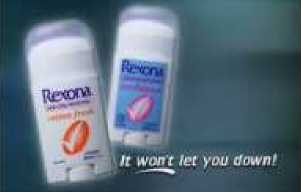
Rexona as the world’s no. 1 and the world’s bestselling deodorant formulated with fresh light fragrance and 48-hours wetness protection will keep the user’ body dry, fresh, and confident throughout the day. Based on the Oxford Advanced Learner’s Dictionary,
Down in the slogan “It won’t let you down” is lexically ambiguous because down can mean “in a lower or less in some value” and “sad”.
Down as in a lower or less in some value (adverb) reflects how confidence is affected by the use of this product. Meanwhile, Down as sad (adjective) as the reflection of someone’s feeling that arises because of body odor. From both meanings, the most suitable meaning for the ambiguous word down is in a lower or less in some value because it refers to the actual meaning, in this case, it reflects the user’s confidence that increased after the use of this product. It gives very good impact to make Rexona as the world’s no. 1 and best-selling deodorant. Thus the meaning indicates Conceptual meaning. Both meanings are different. Both are spelt and pronounced alike i.e. /daʊn/ even though they come from different word classes. Thus, lexical factor that makes down lexical ambiguity is Homonymy.
5.3 Data 3
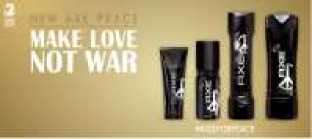
Axe Peace products with fragrances help men stay fresh, smell great and feel their best launched on Peace Day, September 21st, 2014. On that day, Axe encourages guys and girls around the world to start
thinking of peace as cool by making great enjoyment through the fragrances. Based on the Oxford Advanced Learner’s Dictionary, the word war in the slogan “Make Love not War” is a kind of Lexical ambiguity because war can be mean “a state of fighting” and “conflict”. From both meanings, the most suitable meaning of the ambiguous word war is the first meaning a state of fighting since it refers to the actual meaning, in this case, it is related to the World Peace Day and the launch of Axe new products with fresh fragrances presented to encourage guys and girls all around the world to make peace on that day. Thus, the meaning indicates Conceptual meaning. Both meanings are
different but related. They come from the same word class, that is, Noun thus, lexical factor that makes war lexical ambiguity is Polysemy.
Clear as a hair care products not only to eliminate dandruff, but also prevent dandruff from returning and not accessible to view. Based on the Oxford Advanced Learner’s Dictionary, the word hide in slogan “No dandruff, nothing to hide” is Lexical ambiguity

because hide can mean “Keep out of sight” and “The animal skin”. Hide as Keep out of sight (verb) shows the benefit of using the product to make dandruff no longer visible. Meanwhile Hide as the animal skin (noun) intended to big animal skin and rough like buffalo or horse. From
both meanings, the most suitable meaning for the ambiguous word hide is keep out of sight because it explains more specifically the purpose and benefit of using the product and the meaning refers to the actual meaning of hide in this context thus, the meaning
indicates Conceptual meaning. Both meanings are completely different and come from different word classes too. But, both are spelt and pronounced alike i.e. /hʌɪd/ thus, lexical factor that makes the word hide as Lexical ambiguity is Homonymy.
5.5 Data 5

slogan “Declare your beauty”
Lux offers skin cleansing products to care the user’s skin and with unique fragrances to indulge the user’s senses. Lux motivates women to let her beauty enchant those around her. Based on the Oxford Advanced Learner’s Dictionary, the word Declare in is lexically ambiguous because declare can mean
“Announce publicly” and “To make clear”. Declare as announce publicly (verb) means to give public notice about something, in this case, the users’ beauties. This reflects the purpose of Lux in motivating women to let their natural beauty enchant those around them. Meanwhile, Declare as to make clear (verb) is just wanted to highlight the users’ beauties through the use of the product. From both meanings, the most suitable meaning
of the ambiguous word declare is announce publicly because it means to tell a lot of people, in this case, the users’ beauties after using the product and this meaning also refers to the actual meaning thus, indicates Conceptual meaning. Both meanings are different but are related and come from the same word classes that is verb thus, the lexical factor that makes declare lexically ambiguous is Polysemy.
Magnum is one of the world’s most luxurious ice cream brands, made from Belgian chocolate. Based on the Oxford Advanced Learner’s Dictionary, the royal in slogan “Enjoy the royal treatment” is lexically ambiguous because the royal can mean “Having the status of a king or queen” and “Luxurious”. The royal as having the status of a king or queen is related to the expensive
goods and lifestyle. This Ice Cream is quite expensive compared to other ice cream bars but reasonably worth with the sense offered. This suggests a lifestyle of hedonism as if to be king or queen. Meanwhile, the royal as luxurious reflects the main ingredient of this ice cream made from Belgian chocolate which is very expensive, so the ice cream price also becomes expensive. This is giving the impression of luxury in every bite of the ice cream. From both meanings, the most suitable meaning of ambiguous the royal is luxurious since the campaign positioning Magnum to be able to indulge the senses through delicious taste of Belgian chocolate as chocolate with the best taste quality that inspires the costumers for what is luxurious and expensive. Both meanings are different but related. They come from the same word class, that is, Adjective thus, lexical factor that makes the word royal lexically ambiguous is Polysemy.
5.7 Data 7
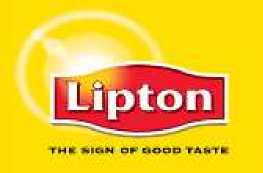
Lipton becomes the number one tea brand globally with great tastes for the consumers’ refreshment. Lipton teas help the consumers drink better to live better. Based on the Oxford Advanced Learner’s Dictionary, the sign in slogan “The sign of good taste” is lexically ambiguous because the
sign can mean “Symbol” and “The use of gesture to give information”. The sign as symbol (noun) means something that represents the good taste, in this case, the good
taste was produced from the Lipton teas. Meanwhile, the sign as the use of gesture to give information (verb) means any action or movement of part of the body to send a visual signal that expresses an idea. From both meanings, the most suitable meaning of ambiguous word the sign is symbol because the symbol used to represent something, in this case, good taste and this meaning refers to the actual meaning of the sign thus, indicates Conceptual meaning. Both meanings are completely different and they come from different word classes too. However, both are spelt and pronounced alike i.e. /sʌɪn/ thus, the lexical factor that makes sign lexically ambiguous is Homonymy.
Zwitsal is widely recognized for delicate, high-quality baby skincare products. Zwitsal prides themselves on being tested hypo-allergenic (it is safe for babies with sensitive skin), pH balanced and an extra soft formulation which is gentle and
healthy for the baby’s skin. Based on the Oxford Advanced Learner’s Dictionary, beautiful in slogan “beautiful ways to care for baby’s delicate skin” is lexically ambiguous because beautiful can mean “Pleasing the sight or mind” and “Very good”. Beautiful as pleasing the sight or mind refers to something in positive impact and have aesthetic sense. For example, Hypo-allergenic protection is reflected in this product obviously has a positive impact, smooth and healthy on the baby's skin. So, people who see will also feel pleased. The meaning contains the values of certain emotions, such as beautiful. This is related to the end results after using the products thus, the meaning indicates Connotative meaning. Meanwhile, beautiful as very good this can be associated with hypo-allergenic test and the use of perfect formula by Zwitsal in its products make the product suitable and good for all babies’ skin types. From both meanings, the most suitable meaning of the ambiguous beautiful is pleasing the sight or mind since it is related to the product that has aesthetic sense and positive impact for the baby’s skin after the use of product. Both meanings are different but related. They come from the same word class that is Adjective thus, the lexical factor that makes beautiful lexically ambiguous is Polysemy.
5.9 Data 9

Hellmann’s mayonnaise is America's no. 1 mayonnaise brand. Its great taste is suitable for fish, chicken, grains, vegetables and salads. Based on the Oxford Advanced Learner’s Dictionary, the best in slogan
“Meet our family. Bring out the best at your table” is Lexical ambiguity because the best can mean “The most excellent quality” and “The highest degree; beyond all others”. The best as the most excellent quality (adjective) in this case, the most excellent quality is a quality owned by Hellmann's Mayonnaise products. Considering that the product is suitable for various foods. Meanwhile, the best as the highest degree; beyond all others (adverb) show that this product is superior to other types of mayonnaise, such as Kewpie or Duke's Mayo. It was proved by Hellmann's mayonnaise which becomes no. 1 mayonnaise brand in America. This meaning refers to the actual meaning thus, indicates Conceptual meaning. From both meanings, the most suitable meaning of ambiguous the best is the highest degree; beyond all others because indirectly describe the quality of this product, including taste and ingredients, which make it a famous mayonnaise brand especially in America. Both meanings are different and come from different word classes too. However, both are spelt and pronounced alike i.e. /bɛst/ thus, the lexical factor that make the best lexical ambiguity is Homonymy.
After analyzing 13 Unilever global brands, it was found that 10 slogans contain ambiguous words of which the meanings of ambiguous words are categorized as Conceptual meaning (because the meanings of the ambiguous words refer to the actual meaning) and the meanings of ambiguous words on 3 other brands categorized as Connotative meaning (because the meaning of the ambiguous words contain value of certain emotion). Meanwhile, the lexical factor that caused the lexical ambiguity on 7 brands slogans is Polysemy and lexical factor that caused lexical ambiguity in 6 other brands slogans is Homonymy.
7.Bibliography
Dyer, Gillian. 1982. Advertising as Communication. England: Clays Ltd.
Leech, G. 1981. Semantics: The Study of Meaning, 2nd Edition. Middlesex: Penguin Books.
Ullman, Stepen. 1972. Semantics: An Introduction to the Science of Meaning. Oxford: Basil Blachwell
http://en.wikipedia.org/wiki/Ambiguity on April 30th, 2016 at 09.00 AM
https://www.unilever.com/brands/ on October 16th, 2016 at 09.06 AM
101
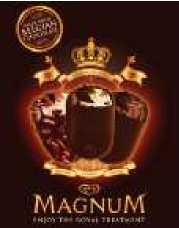
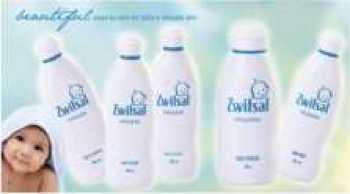
Discussion and feedback